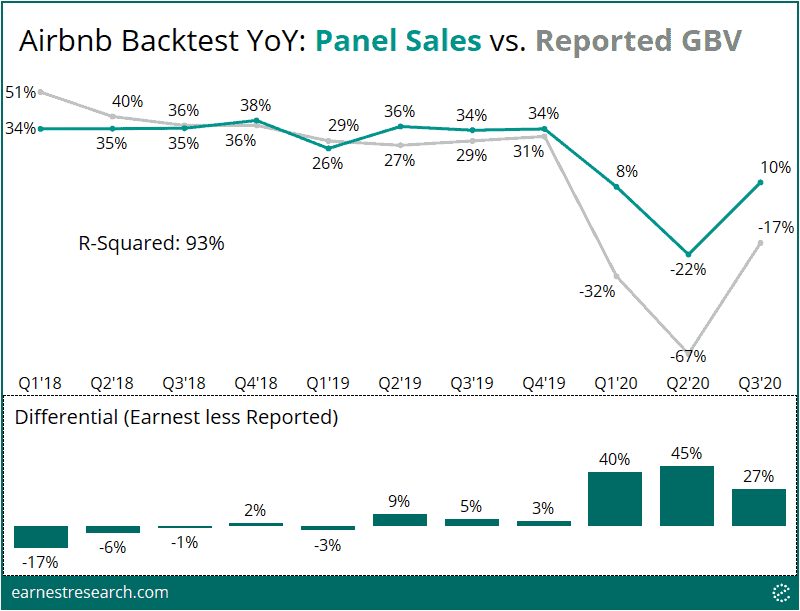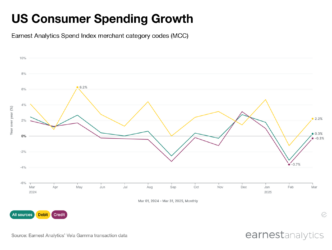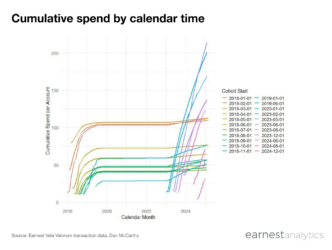Airbnb’s S-1: A COVID Threat or Opportunity?
In anticipation of Airbnb’s IPO, we reviewed statements made in the company’s S-1 and compared them with our spend data of millions of de-identified US consumers. We’ve also added an appendix with a backtest of our data against the company reported GBV. Please reference for detail on biases and alignment with our data.
Key Takeaways
- COVID disrupts, then rebounds. Spend on the gig economy hotel disruptor platform fell ~60% YoY in April and May 2020 due to the pandemic, a sharp decline relative to the ~20 to 40% growth profile in the 18 months prior. By June, however, there was a partial but still material rebound which continued into the fall.
- Average ticket growth jumped over 100% in April, and remains elevated, driven by extended-stay booking behavior with higher price points.
- In the five years prior to COVID, Airbnb grabbed over 20 points of market share from its OTA and hotel competitors. The pandemic only furthered this share grab, adding an additional ~10-20 points of share during the spring months, with only a recent trend towards normalization. Expedia’s HomeAway platform also gained share during the pandemic due to its equivalent extended-stay/quarantine-friendly model.
- Annual retention rates of ~45% for 2015-2017 Airbnb cohorts was on par with—even slightly lower than—Expedia’s HomeAway platform; but the 2018 cohort strongly surpassed it at ~55%. COVID caused retention to deteriorate for virtually all Airbnb cohorts, but the customer lifetime value far exceeded historical norms due to the pandemic’s higher ticket booking size.
- Spend in the panel’s top twenty US cities declined ~5 to 10 points more than the rest of the country throughout the pandemic, driven by NYC and San Francisco which lagged the rest of the country by ~10 to 20 points.
COVID Disruption, Then Rebound
“In early 2020, as COVID-19 disrupted travel across the world, Airbnb’s business declined significantly. But within two months, our business model started to rebound even with limited international travel, demonstrating its resilience…Domestic travel quickly rebounded…as millions of guests took trips closer to home. Stays of longer than a few days started increasing as work-from-home became work-from-any-home on Airbnb.”
Airbnb S-1
Spend on the gig economy hotel disruptor platform did indeed “decline significantly” during the initial outbreak of COVID in April and May 2020, falling ~60% YoY relative to the ~20 to 40% growth profile in the 18 months prior. There was a partial but still material rebound* in June and July, where growth improved to low single digits, which then further improved to mid-teens growth from August through October.
Additionally, while spend data cannot track the duration of an Airbnb visit, there was a material jump in average ticket growth (100%+), a reflection of the stated extended booking behavior, as longer stays come with higher price points. Importantly, ticket growth has remained elevated at ~70% growth over the last several months.
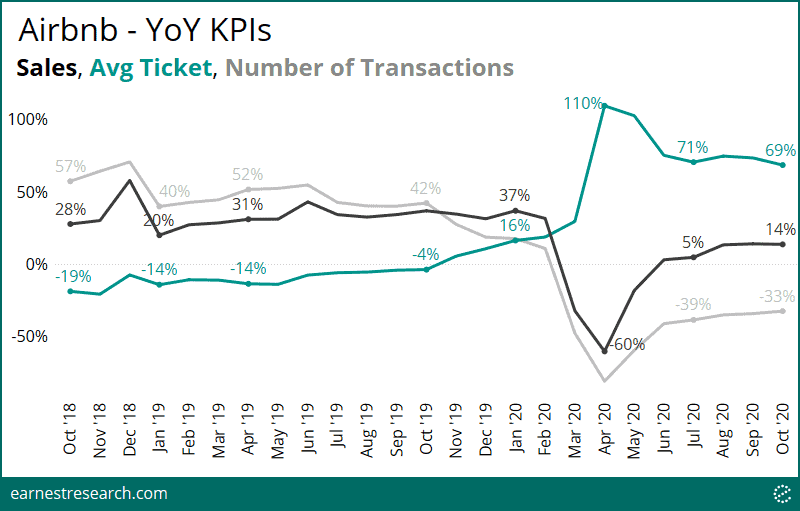
Market Share
“We believe our competitors include: Online travel agencies (“OTAs”) [and] hotel chains…”
We looked at Airbnb’s market share gains from the perspective of both the OTA and hotel markets, and further analyzed them pre- vs. post-COVID.
Before COVID, Airbnb’s market share gains amounted to over 20 points in the five years prior to COVID, surpassing both OTA competitor Expedia and hotel chains Marriott and Hilton, commanding ~30% of the hotel market and ~40% of the OTA market.
COVID only accelerated these gains further. While both markets were hit hard from April onwards, relative to traditional travel and hotel chains, the pandemic shined a positive light on Airbnb’s extended-stay and quarantine-friendly business model. This resulted in a further ~10 to 20 point share grab in the spring months, with only a recent trend towards normalization as traditional hotel chains revived a little in the recent months. We note that Expedia’s HomeAway platform also gained share through the spring with its equivalent extended-stay/quarantine-friendly model.
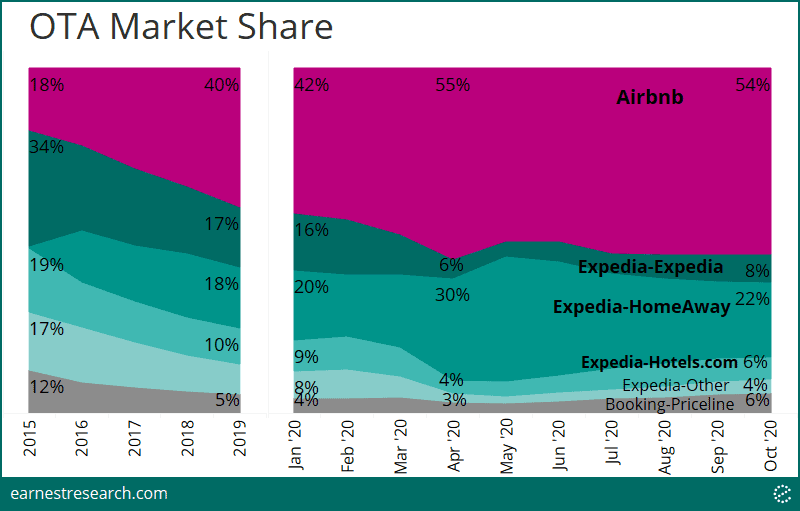
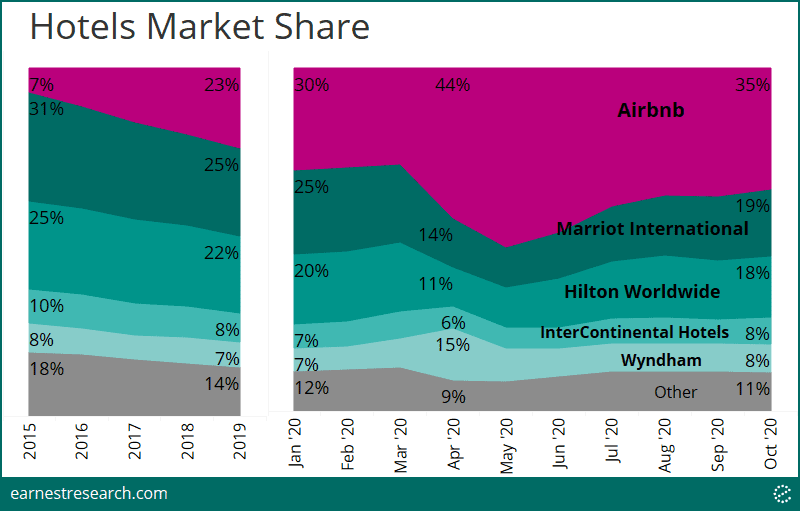
Guest Retention
“We believe the guest revenue retention of our community is higher than the customer retention of OTA distribution platforms in the United States, based on available third-party credit card data…Guest revenue retention will deteriorate across all cohorts in 2020 due to the decline in travel from COVID-19.”
Earnest data shows Airbnb guests with higher retention rates relative to its peers, although, before 2018, retention was on par with—even slightly lower than—Expedia’s HomeAway platform. Roughly ~45% of the 15’, 16’ and 17’ Airbnb cohorts came back to the platform in the 12 months following their first booking; a rate that improved to ~55% for the 18’ cohort. Long term retention rates at Airbnb appear to stabilize at ~38%, substantially higher than its peers.
Further, all cohorts have indeed exhibited deteriorated retention throughout 2Q20. Importantly, however, the lifetime value of the 2Q20 cohort has been significantly higher, a product of increased ticket sizes due to longer stays as referenced above.

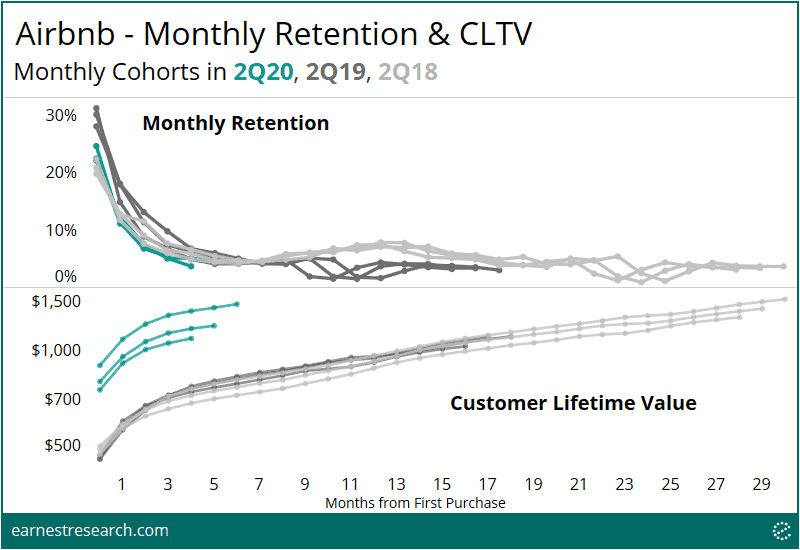
Top 20 Cities
“Travel outside of our top 20 cities (based on 2019 GBV) has been more resilient than those booked in our top 20 cities.”
While Earnest data is US only (vs. Airbnb’s global reach), the number of bookings made by consumers in the panel’s top twenty US cities declined ~5 to 10 points more than the rest of the country (RoC) throughout the pandemic months. We note that this appears to be mostly driven by NYC and SF, where consumers booking Airbnb trips fell ~10 to 20 points more than the rest of the country, and is still declining over ~40% relative to RoC’s ~30% declines in October.
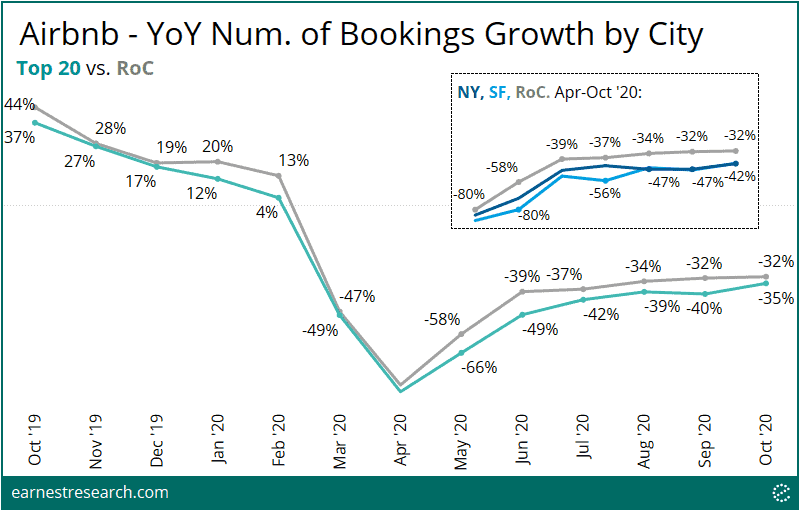
Notes
*Based on the backtest (see appendix below), Earnest data overstated the actual rebound. Please reference the appendix note for detail on the relationship between the data and reported GBV.
Appendix: Airbnb Backtest
